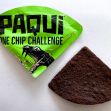The spicy “One Chip Challenge” tortilla chip is being pulled from store shelves across the nation after a 14-year-old Massachusetts teen reportedly died after eating the chip.
The chip gained popularity on social media, garnering the attention of teens and young adults. The challenge urges participants to film themselves eating the product as they record how long they can go without eating or drinking anything to alleviate the pain caused by the heat.
Paqui, the makers of the “One Chip Challenge,” claim their product is the spiciest tortilla chip in the world. According to the website, the chips are seasoned with Carolina Reaper peppers and Naga Viper peppers, among other spicy ingredients. The single chip comes packaged in a coffin-shaped box and features a skull with a snake, nodding to the extreme heat the chip is known for.
The marketing of the chip as “deadly” purportedly became the reality for 14-year-old Harris Wolobah, a sophomore at Doherty Memorial High School in Worcester, Massachusetts. According to the family, Harris died after he tried the chip challenge while at school. After eating the chip, he went to the nurse's office complaining of a stomach ache. Later in the day, the teen passed out at his home and was rushed to the hospital where he was pronounced dead. An autopsy determined the cause of death has not yet been revealed.
While the chip has not officially been recalled or been the subject of a notice by the U.S. Department of Agriculture (USDA) or the U.S. Food and Drug Administration (FDA), Paqui voluntarily chose to pull the chip from store shelves across the nation after the teen’s death. The chipmaker is also offering refunds. In a statement shared by a Paqui spokesperson, the company expressed its sadness over the loss of the teenager.
“While the Paqui One Chip Challenge is intended for adults only, we have seen an increase in teen usage of the product. We care about all of our consumers and have made the decision to remove the product from shelves,” the spokesperson said. “We are actively working with our retailers and are offering refunds for any purchases of our single-serve one chip challenge product.”
The company adds they are “deeply saddened by the death of Harris Wolobah and express our condolences to the family.”
As part of its marketing campaign, Paqui promoted the chip on social media, daring participants to join the challenge and post pictures of their tongues and their reactions. The chip, which is so spicy the packaging warns you to wash your hands with soap and water when you handle it, can turn a consumer's tongue blue once they put it in their mouth.
In the United States, there are no specific federal laws that dictate how spicy food can be in terms of the level of spiciness or the use of specific spicy ingredients. The FDA primarily regulates food safety, labeling, and additives rather than the spiciness of food.
Industry players that engage in food challenges, including restaurant owners, may require consumers to sign a waiver that frees them of any liability if their consumers suffer adverse reactions after eating their food. In the case of Paqui’s “One Chip Challenge,” consumers are warned with a label that the product is intended for adults and not suitable for younger individuals and teens, as well as those who are sensitive or allergic to spicy ingredients.
According to the Scoville scale, the metric by which the spiciness of chili peppers is measured, a jalapeño pepper rates up to 8,500 Scoville heat units. The Carolina Reaper and Naga Viper Peppers used in the Paqui chip measure out to 1.7 million Scoville heat units and around 1.4 million, respectively.






